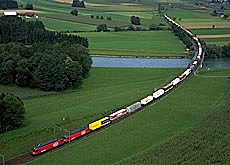swiss drive towards freight success

Prosperity depends on the transport of goods, even if the Swiss don't like to admit it, says Markus Breisinger, a top freight expert.
For the vice president of Spedlogswiss, the national association of freight forwarders, the importance of the forwarding and logistics industry is underestimated.
The major service industries for which Switzerland has a worldwide reputation not only include banking, insurance and the hotel business, but also freight forwarding and logistics.
Few people realise that the forwarding and logistics business provides 130,000 jobs in the country alone. The sector also creates around SFr35 billion ($29 billion) of added value, contributing about four per cent of the gross domestic product (GDP).
Three of the world’s biggest forwarding companies have their headquarters in Switzerland.
The International Federation of Freight Forwarders Associations, FIATA, is also based in Zurich.
Freight companies Panalpina and Kühne & Nagel are both listed on the Swiss stock exchange, while famous names like Danzas (now owned by Deutsche Post) have roots going back to the 19th century.
Gateway to Switzerland
One of the main centres of the industry is in Basel, known as the “Gateway to Switzerland” because of its Rhine ports.
For many years foreign trade meant crossing borders, but today firms must think on a world scale. The forwarding companies have therefore evolved into global logistics specialists.
As such, they are integrated into
today’s component and assembly economy, the so-called “just in time” production method practised by many manufacturers.
To avoid warehouse costs, firms often farm out the various stages of production to companies all over the world, says Breisinger, who is also the general manager of the Transfreight company.
“The abandonment of traditional industrial production methods created new chances for the forwarding firms. But it also means that the transport routes are becoming more and more chaotic,” he told swissinfo.
Unpredictable obstacles like congestion on European roads, bottlenecks at ports and long delays
mean that transport operations are never a matter of routine.
In the old days state borders and customs controls were regarded as hindrances which were built into forwarding firms’ planning.
Today they have to have a global presence, says Breisinger. “Clients are globally orientated, and they expect their forwarders to have offices everywhere, to be as physically present on the ground as possible.”
On time
Breisinger blames much of the congestion problem on ever increasing volumes of foreign trade and the demand for “just in time” deliveries.
“It used not to matter whether the ten-ton steel order was delivered to the plant today or tomorrow.
“And if the Rhine levels were low, you could wait, confident in the knowledge that the manufacturer still had stocks of steel in the warehouse,” Breisinger recalls.
But today it is essential to make the deliveries on the stipulated day. If the Rhine is too low, goods must be transferred to rail or road.
“If it isn’t possible to ship by barge, I will use rail instead, and if there is insufficient rail capacity, that means sending by road.”
Breisinger is well aware that the excessive amount of traffic on today’s roads is the result of
pressure to keep to agreed delivery times, coupled with greater flexibility. “That is something that the public doesn’t like to hear,” he notes.
As a professional in the freight business, Breisinger regards the politically motivated policy of forcing freight from road to rail as out of tune with economic reality.
“Politicians have made a lot of mistakes as far as freight transport is concerned,” he says.
For example, in its 100-page report on aviation policy the Swiss government quite simply forgot to include freight, he adds.
And yet 30 per cent of Swiss exports go by air. Representatives
of the industry are said to have managed to correct this in the report at the very last minute.
swissinfo, Alexander Künzle
Swiss freight forwarding and logistics create SFr35 billion worth of added value every year.
This amounts to about 4% of GDP.
The freight forwarder is a kind of “travel agent” for goods.
It works with shipping companies, airlines, rail companies or trucking firms to transport the freight.
Switzerland has a highly developed freight and logistics industry, because as a small inland country heavily dependent on foreign trade, it has always needed an efficient transport system for its products.
Typical Swiss specialities and niche markets include the transport of dangerous goods or complex items, and those requiring special safety procedures.
The large proportion of contracts with fixed delivery dates is a consequence of the “just in time” strategy.
This is also why the sector is sceptical about political demands to increase the transfer of freight from road to rail.
(Adapted from German by Kathleen Peters)

In compliance with the JTI standards
More: SWI swissinfo.ch certified by the Journalism Trust Initiative
You can find an overview of ongoing debates with our journalists here. Please join us!
If you want to start a conversation about a topic raised in this article or want to report factual errors, email us at english@swissinfo.ch.